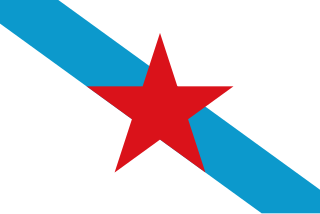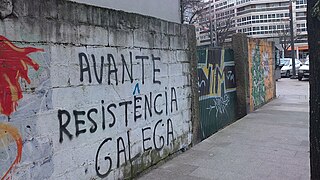
The Galician Nationalist Bloc is a political party from Galicia, formed with the merger of a series of left-wing Galician nationalist parties. It is self-defined as a "patriotic front".

Alfonso Daniel Manuel Rodríguez Castelao, commonly known as Castelao, was a Galician politician, writer, painter and doctor. He is one of the fathers of Galician nationalism, promoting Galician identity and culture, and was one of the main names behind the cultural movement Xeración Nós. He was also one of the founders and president of the Galicianist Party and had a great influence on the renovating group of Galician art known as Os renovadores. Castelao is considered to be the most important figure in Galician culture of the 20th century.

Communist Party of National Liberation was a separatist political party in Galicia, Spain. PCLN was founded on 25 July 1986 by the 22 March Communist Collective. The collective had been launched earlier by 13 Central Committee members of the Galician People's Union (UPG) left UPG in protest of the decision of the Galician Nationalist Bloc to participate in the Galician parliament. Front figures of the collective was Mariano Abalo, general secretary of UPG, and Xan Carballo, general secretary of INTG.

Galician nationalism is a form of nationalism found mostly in Galicia, which asserts that Galicians are a nation and that promotes the cultural unity of Galicians. The political movement referred to as modern Galician nationalism was born at the beginning of the twentieth century from the idea of Galicianism.

Xosé Manuel Hixinio Beiras Torrado is a Galician politician, economist, writer and intellectual. He is professor of Structural Economy at the Faculty of Economic Sciences of the University of Santiago de Compostela. He is a former member of the National Council of the Galician Nationalist Bloc, he is currently the leader of Renewal–Nationalist Brotherhood, an independentist political party. He formerly had representation in the Galician parliament.
Ricardo Flores Peres, was a defender of the Galician independentist movement, in 1920s and 1930s by a means of the Pondal Nationalist Society, and its periodical, A Fouce.

Galician, also known as Galego, is a Western Ibero-Romance language. Around 2.4 million people have at least some degree of competence in the language, mainly in Galicia, an autonomous community located in northwestern Spain, where it has official status along with Spanish. The language is also spoken in some border zones of the neighbouring Spanish regions of Asturias and Castile and León, as well as by Galician migrant communities in the rest of Spain, in Latin America including Puerto Rico, the United States, Switzerland and elsewhere in Europe.

Resistência Galega, sometimes referred to as REGA, is the term used by a series of left-wing and Galician separatist organisations and individuals to claim attacks in Galicia. The term was first used in 2005 when a manifesto named Manifesto da Resistência Galega appeared on the Internet. Since then, Resistência Galega has carried out dozens of attacks against political party offices and banks across Galicia.
Loita Armada Revolucionaria(LAR) (English: Revolutionary Armed Struggle) was an armed Galician nationalist and left-wing independentist organisation. Linked to the political party Galician Party of the Proletariat and the organization Galiza Ceibe-OLN, the group was formed in 1978 and carried out several attacks around Galicia, such as bank assaults and bombing campaigns.

Renewal–Nationalist Brotherhood is a political party in Galicia. Formed in 2012, under the guidance of historical leader Xosé Manuel Beiras, Anova was formed by Encontro Irmandiño, the FPG, Movemento pola Base, the Galician Workers Front, and independents. Anova defines itself as a Galician nationalist, socialist, feminist, ecologist, internationalist organization and advocates for Galician independence. Its internal organization is run by assemblies.

Galiza Nova is the youth organisation of the Galician Nationalist Bloc, founded in 1988.
The Assembly of the United People (APU) was a Galician political organization, with an independentist, socialist and feminist ideology. It was formed in 1989 from a split of the first Galician People's Front, and disappeared with its self-dissolution in 1995.
The Assembly of the Independentist Youth is a Galician independentist and socialist and feminist political organization formed and formally established by young people in Bueu in 1996, although it have been working in coordination since 1993. AMI dissolved itself in 2014, citing the repression, changing political cycle and the decline of militancy as the main reasons.

The Galician Movement for Socialism was a Galician communist, pro-independence and feminist organization. The MGS was born in March 2009, although its origins go back to the summer of 2006. The MGS works inside the Galician Nationalist Bloc and the Confederación Intersindical Galega.

Briga is a Galician independentist political organization formed by young people in 2004 as a split of the Assembleia da Mocidade Independentista. It is the youth wing of the political party Nós–Unidade Popular and defines itself as a socialist, anti-patriarcal, ecologist, anti-authoritarian, anti-imperialist and internationalist organization. It also defends social monolingualism and linguistic reintegrationism in Galiza. Briga has AGIR as its reference in student unionism.

Commitment to Galicia is a Galician political party with a Galician nationalist, progressive ideology.
The Galician Rural Federation is a Galician farmers and breeders union centered on family farms and small peasants. The organization has its origins in a split of the Sindicato Labrego Galego-Comisións Labregas (SLG) in 2009. The splitters, that later founded FRUGA, wanted the SLG to take a closer political line to the Galician Nationalist Bloc and the Galician People's Union. FRUGA is particularly strong among milk cows small farmers.
Movemento pola Base is a Galician pro-independence and left-wing political organization. The MpB was born in the summer of 2006 from a group of militants of the Galician Nationalist Bloc (BNG), critical with the political line of the organization at the time.

Manuel María Fernández Teixeiro, better known as Manuel María, was a Spanish poet and academic who wrote in the Galician language. He was notable for his combative character and his political commitment. His poetry touched on themes of love, art, his own political commitment, drawing attention to wrongs, ethnography, physics, history, immateriality, mythology, the animal world, poetic expression, the passing of time, religion, society, language, agricultural labour, urbanism, and geography. The Day of Galician Literature was devoted to him in 2016.

Galicia irredenta or Galicia estremeira, also spelled as Galiza irredenta and Galiza estremeira and also known as Faixa Leste or Franxa Leste, is a term used for all Galician-speaking territories located outside of Galicia. These are all located in Spain, in either Asturias or Castile and León. These territories are sometimes divided into three subregions: El Bierzo, Eo-Navia and As Portelas.














